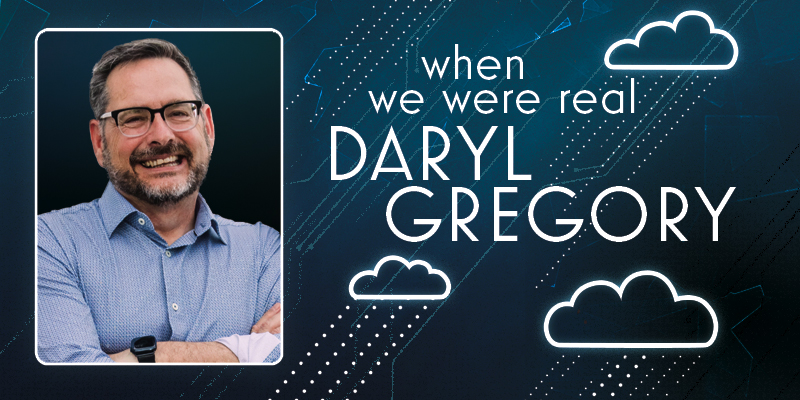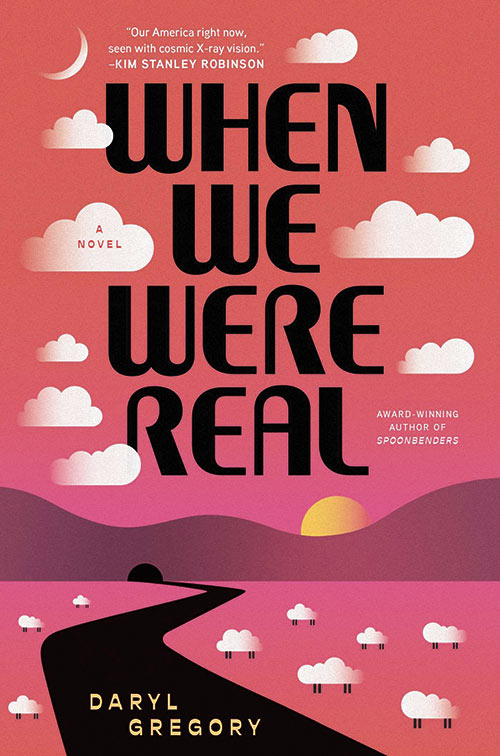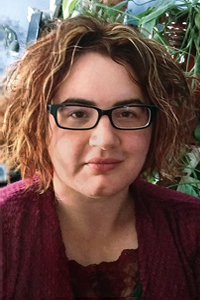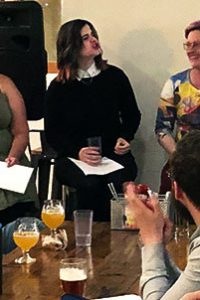Daryl Gregory: When We Were Real

DARYL JON GREGORY was born June 26, 1965 in Illinois, grew up in Darien IL, and attended college at Illinois State University, graduating with a double major in English and Theater. He taught high school for a few years, became a technical writer, and worked as a computer programmer before becoming a full-time writer. He had two children, now adults, with wife Kathy Bieschke.
In 1988 Gregory attended the Clarion workshop, where he wrote ‘‘In the Wheels’’, his first publication, which appeared in F&SF in 1990. Other stories include ‘‘Taking the High Road’’ (1991), ‘‘The Sound of Glass Breaking’’ (1992), ‘‘An Equitable Distribution’’ (1997), ‘‘Free, and Clear’’ (2004), Sturgeon Award finalist ‘‘Second Person, Present Tense’’ (2005), ‘‘Dead Horse Point’’ (2007), ‘‘The Illustrated Biography of Lord Grimm’’ (2008), Hugo Award finalist ‘‘Nine Last Days on Planet Earth’’ (2018), ‘‘Brother Rifle’’ (2020), ‘‘The Virgin Jimmy Peck’’ (2022), ‘‘Once Upon a Future in the West’’ (2022) and, most recently, ‘‘I’m Not Disappointed Just Mad AKA The Heaviest Couch in the Known Universe’’ (2024). Novella We Are All Completely Fine (2014) won World Fantasy and Shirley Jackson Awards and was a Sturgeon Memorial and Nebula Award finalist. Novella The Album of Dr. Moreau (2021) was nominated for a Sturgeon Memorial Award and an Edgar Award. Some of his short work has been collected in Unpossible and Other Stories (2011). Gregory has also written for comics, notably for the Dracula: Company of Monsters and Planet of the Apes series from Boom! Studios.
First novel Pandemonium (2008) was a World Fantasy, Mythopoeic, and Shirley Jackson Award finalist, and won the Crawford award for best first fantasy. Second novel The Devil’s Alphabet (2009) was a Philip K. Dick Award finalist, and zombie novel Raising Stony Mayhall appeared in 2011. SF novel Afterparty (2014) was a Campbell Memorial Award finalist, and he branched into young-adult fiction with Lovecraftian novel Harrison Squared (2015). His family (with psychic powers) saga Spoonbenders (2017) was a World Fantasy and Nebula Award finalist, and historical Appalachian horror novel Revelator (2021) was a Dragon Award nominee.
His latest book is SF novel When We Were Real, out this month.
Excerpt from the interview:
 “When We Were Real is coming out on April first. The writing process was kind of terrible, because unlike some writers, I don’t have an idea notebook like, ‘Here are my next seven novels, and just you wait!’ I usually finish a novel and then think, ‘Well, that was it. That was my last idea, and I’m done now.’ I would wave goodbye. It’s such a long, stupid, painful process, but when I start a new book I write in my notebook a lot, read a bunch of stuff, just searching for ideas. Part of the process is where – as I’ve been telling my students – you kind of mine your heart. You make lists of ‘Everything I Love, Everything I Fear, Everything I Hate,’ and you’re trying to figure out, ‘Where am I at in my life, and is there a science fictional idea that speaks to that moment?’
“When We Were Real is coming out on April first. The writing process was kind of terrible, because unlike some writers, I don’t have an idea notebook like, ‘Here are my next seven novels, and just you wait!’ I usually finish a novel and then think, ‘Well, that was it. That was my last idea, and I’m done now.’ I would wave goodbye. It’s such a long, stupid, painful process, but when I start a new book I write in my notebook a lot, read a bunch of stuff, just searching for ideas. Part of the process is where – as I’ve been telling my students – you kind of mine your heart. You make lists of ‘Everything I Love, Everything I Fear, Everything I Hate,’ and you’re trying to figure out, ‘Where am I at in my life, and is there a science fictional idea that speaks to that moment?’
“There was so much talk about, ‘Are we living in a simulation?’ There were the Matrix movies, and one early thought I had was I really resented how in The Matrix, by their own rules, Neo and Trinity are just killing people right and left who are real, innocent people who just happen to be possessed, but they still die in their pods. I thought, ‘That’s kind of morally reprehensible,’ and then I thought, ‘Well, what about all the other people in the simulation who aren’t the heroes? Aren’t they real too?’
“So that started one idea, and then the parallel idea came from a good friend of mine. He’d gotten a brain tumor and we had a scare. He’s fine now, but I was thinking a lot about mortality, and getting older, and male friendships, and a road trip he and I took across the country. The original novel idea was, ‘Two guys on the road talking about living in the simulation,’ and then I realized that was way too claustrophobic. So I thought, ‘What if they’re on a tour bus with other people?’ Then it became, ‘What if it’s Canterbury Tales? What if I do the opening of Canterbury Tales and just keep going?’ I threw in some Gilgamesh stuff, and gradually, the book kept growing from there. I decided to give everyone on the bus – 19 people including the driver and the tour guide – their own POV chapter and their own story arc. Everybody would have a competing argument about what’s happening in this simulation, what does it mean, and where are we going. Where they’re going, physically, is taking a bus tour to visit the Impossibles, which are these things in the landscape that break the laws of physics, that appeared when the simulation was revealed, and are proof that they’re living in a simulation. Also every week they get a sort of user agreement that pops up in front of their eyes saying, ‘By the way, you are still living in a simulation, thank you very much.’
“A lot of my books are road books because I grew up in a family where we were on the road a lot, and it just seemed totally natural to pack sandwiches and drive for 12 hours a day. The problem is, my dad was all about making time – we had to make time! – so he wouldn’t stop at the giant Rubber Band Ball or the Biggest Ball of Yarn – ‘Oh, there it goes!’ He wouldn’t even stop at McDonalds. I learned to just sit in the backseat with a book.
“Doing When We Were Real as a road story gave me a built-in structure: Every day the group would visit a different Impossible, and things would get worse and worse as they go along, and all the secrets of the people on the bus would start spilling out. I pitched this to my agent as, ‘It’s like The Matrix, but just the boring parts.’ He said, ‘Please never tell anyone that.’ And here I am telling Locus. The idea was that it would be about a bunch of people arguing about being in the simulation, but there would be no guns. And then, of course, by the end of the book, there are guns, mostly in the hands of a group of people called The Protagonists who believe The Matrix was scripture, and things get out of control.
“There are also these four horny octogenarians in the back of the bus, and they were there from the very beginning – I just thought they’d be fun to write about. As I write, I try to stay in touch with my inner boredom. ‘These people could be more interesting,’ and you figure out who they are and what they really want. It’s funny – I’m good at voice, and I’m good at initial characters; I can hear people talking pretty clearly early in the process. But seeing is more vague, and so I have to really pay attention to see what they look like. And then I go back and rewrite – it’s a recursive process. A lot of times, I do a rewrite that’s just about one character. Like the rabbi in the book, I realized late in the book, ‘Oh, there are some things I can make much stronger in his story,’ so every single time he appeared, I kept track of where he was at in his arc, and tried to tweak that up a notch and move him along in his story, like a little cribbage peg: ‘Can he move one step forward in this scene?’
“The book is about bonding experiences that happen to a group. I found out at a certain point in my career that I write better out of empathy. My writing is just better if I love the characters, even if they’re annoying. If I just try to love them, and to figure out things that they love, everything gets better. There are some writers who can write beautifully out of hate and disgust, and satire writers who are like, ‘Look at all the idiots in the world – I’m going to take them down a peg.’ But that doesn’t work for me.
“I like spy movies, and television shows where everybody’s betraying each other, but when I sit down to write, it makes me feel terrible if I’m constantly thinking about how people are lying to each other and betraying each other. I just write better from empathy. So every person in the book has someone who loves them outside of the bus, and someone they love. Gradually, the characters start to take care of each other. The point I wanted to make is that, as things get worse and worse, basically every single member of the bus has to save somebody else by the end. They’re all responsible for saving each other, to get out of this tremendous jam they find themselves in at the end of the book.
“One of the main characters, the professor, has a deep empathy for digital creatures that are being created somewhere else. She’s extrapolating from her own life with her daughter and her husband to think, if we create artificial general intelligence, will that lead to consciousness? Some people think artificial intelligences will be just like us, or just as smart as us. I don’t think it’ll ever happen, or at least not within the next 20 years or so. But if we do create these AIs, and they’re conscious, and they can suffer, in the Buddhist sense, then we’re responsible for their suffering. We’ve created them, and we’re setting up their entire world and controlling everything they experience, so we have power to either make them suffer or not suffer. That idea really got me, because one of the rules of the novel was, ‘It’s the anti-Matrix,’ so no one’s going to develop superpowers like Neo. I also made the rule that nobody can get out of the sim by super-hacking. Because where would they go? This is the 25th anniversary of the Sims game, but you can’t take one of those little Sim guys and put him in the real world – he has to run on code. Unless you build a robot body that’s running a tiny Sim operating system, then maybe he could control a robot in the world, but the outside programmer would have to set that up for you. You can’t hack your way out of the simulation. That leads to the question, ‘Well, if I’m trapped in the simulation, what’s left to work for?’ My guiding principle for the book was that the job of each person on the bus is to take care of everybody else on the bus. Just like everybody on the planet has to take care of all the people on the planet. It’s our only job. If you start creating other creatures, you have to take care of those people, and that’s what drives this professor – who probably is the most empathetic and ethical person on the bus. She’s thinking more clearly about what it means to create AIs, and what our responsibilities are.
“That’s empathy’s problem, right? Where to draw the line between us and them. There are these circles, and we decide who is inside the circle and who’s outside. It takes real empathy to look outside the circle, and it doesn’t feel natural, because you start to feel the most empathy toward your kids. I’m a new grandfather, so suddenly I’m hyper-focused on this grandchild. But then other people become more and more abstract. People are protecting their families first, and then they ask, ‘Do I have any extra money to support the other stuff I care about?’ It gets more and more nebulous as you go out from the center. But you can try to fight against that impulse.
“One thing science fiction does very well is to make you look at something you don’t understand or you’re repelled by, and force you to say, ‘That could be me.’ I suppose this is the lesson of all fiction. It’s all exercises in empathy; you could be this person in this situation. You can take a person who does objectively terrible things, but from the inside of the novel, if the writer’s good enough, they can bring you in to see at least why they did these things. Later you could say, ‘That was still a horrific thing they did.’ You could write a novel about a concentration camp guard and, in the moment, see why they’re caught up in a larger system, but also say, ‘They should have done something different.’ You’re allowed both reactions.
Interview design by Francesca Myman.
Read the full interview in the March 2025 issue of Locus.
 While you are here, please take a moment to support Locus with a one-time or recurring donation. We rely on reader donations to keep the magazine and site going, and would like to keep the site paywall free, but WE NEED YOUR FINANCIAL SUPPORT to continue quality coverage of the science fiction and fantasy field.
While you are here, please take a moment to support Locus with a one-time or recurring donation. We rely on reader donations to keep the magazine and site going, and would like to keep the site paywall free, but WE NEED YOUR FINANCIAL SUPPORT to continue quality coverage of the science fiction and fantasy field.
©Locus Magazine. Copyrighted material may not be republished without permission of LSFF.







